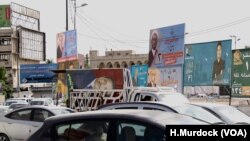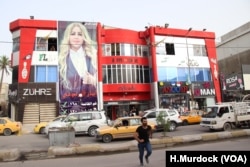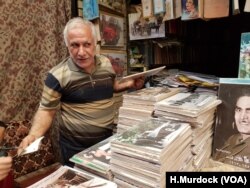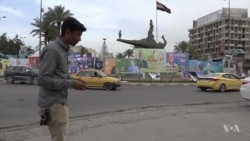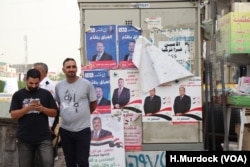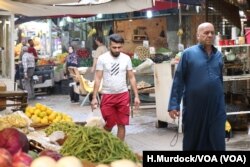A crowd gathered by a police vehicle at the entrance to the historic old market in central Baghdad.
"What's going on?" asked Mohammad, a local journalist.
"They caught a thief," an onlooker said. Young men strained to see police load the accused into a van. "And he wasn't even a member of parliament!" Others in earshot guffawed.
On May 12, Iraqi voters will have a chance to replace their national parliament for the first time since the government declared victory over Islamic State militants last year. Iraqis said they hope the new leadership will curb the corruption seen as one of the root causes of Iraq's decades of wars and economic crises.
"I want to wage a war against corruption," said MP candidate Iman al-Marsomi. "We have more than we should in the parliament and the government facilities."
But this hope, some locals said, may be unattainable.
"It's a desperate situation," said 63-year-old Naja Abood at his bookstore, which sells 19th century volumes left over from colonials and handmade modern Iraqi history pamphlets. "Nothing will be changed. The results are already settled in favor of the ones already famous for corruption."
Candidates and alliances
Nearly 7,000 candidates are running for parliament, and from them, a 329-seat house will emerge.
The government will then form through a series of negotiations, with one of the leaders of the Shia parties to be appointed prime minister — Iraq's head of state.
Iraq's government is based on a quota system, with leadership positions designated to sections of the Iraqi public, including Shia and Sunni Muslims, Kurds, women and other minorities.
WATCH: First Post-IS Iraq Elections: New Era or Same Old Scene?
With political alliances increasingly crossing sectarian lines, no clear majority is expected to win the parliament, according to Nejem al-Kassab, an Iraqi political analyst. A long series of negotiations and horse-trading will precede the selection of head of state and other top positions, he said.
"It will be difficult for them to agree on the leadership," he explained, "because party alliances are no longer based on sectarian blocks."
Current Prime Minister Haider al-Abadi has a leg up, having overseen the near-total defeat of IS militants in Iraq last year, said al-Kassab. Other Shia contenders include former prime minister Nouri al-Maliki and Hadi al-Ameri, a leader of the Popular Mobilizations Units, a Shia-led military force formalized during the battle with IS, also known as Hashd al-Shaaby.
But the upcoming vote and negotiations that follow are unpredictable, he added. For example, one political alliance in Iraq now includes prominent Shia leaders, in addition to secular parties, including Communist. And unlike previous elections, Sunni voters are more likely to vote for al-Abadi's coalition because of the defeat of IS, which occupied primarily Sunni areas in Iraq between 2014 and 2017.
Voter priorities
In post-IS Iraq, entire cities, towns and villages still lie in rubble, and millions of people have been displaced.
Rebuilding, economic recovery and curbing the corruption that hinders both are top priorities for voters, explained al-Kassab. But meaningful change, while possible, will be extraordinarily difficult to achieve.
"The people don't really care who is in power," he said. "They are looking to rebuild after all the wars."
And while there are many voters and politicians that have hope that these elections will usher in a new era of reconstruction, on the streets of Baghdad, many locals said they fear the near future will include more insecurity and economic crises.
"You know when a director puts something at the end of a scary movie to make you think there is another movie coming?" said Hind, a physics teacher shopping for books in the market. "It's that way."
Security of the vote
Flights and roads in Iraq will be shut down for 24 hours on the day of the vote for security purposes in the wake of IS threats against the ballot.
But many locals said, in the relative peace of post-IS Iraq, they are not afraid that the day will end in violence.
"The security forces will do their jobs," said Ali, a 31-year-old wrestler taking a break on the banks of the Diyala River. "It won't be bad."
Long-term security and economic recovery is far more elusive than securing the polling places for a day, added a 24-year-old barber also named Ali. "I think nothing will change after the elections, but still, we hope."




